e-HAIL Members
e-HAIL is a vibrant and diverse community of clinicians and methodologists who are interested in using AI/ML methodologies to do high-impact research on critical healthcare applications.
e-HAIL members participate in twice-monthly research-in-progress meetings, where presenting teams discuss their work, seek feedback from colleagues, and meet potential collaborators in a highly interactive environment.

Andrew Admon, M.D., M.P.H., M.S.
Assistant Professor, Internal Medicine
Areas of Expertise: Critical care epidemiology; health services research; causal inference; observational research methods; clinical data.
Publications:
Beyond Cofounding: Identifying Selection Bias in Observational Pulmonary and Critical Care Research
“I look forward to engaging in research that uses real-world data to improve the care of hospitalized patients. As a practicing ICU physician, health services researcher, and critical care epidemiologist, I’m eager to partner with colleagues on challenging problems that maximally leverage real-world data and cutting edge methods.”

Alauddin Ahmed, Ph.D.
Assistant Research Scientist, Mechanical Engineering
Areas of Expertise: Machine Learning (ML); Artificial Intelligence (AI), data science; drug-like small molecule discovery & design; materials discovery & design; computational method development.
Predicting hydrogen storage in MOFs via machine learning
Machine Learning-Guided Equations for Super-Fast Prediction of Methane Storage Capacities of COFs
“I’m interested in solving pressing healthcare problems in collaboration with the e-HAIL community using my expertise in data science, machine learning, and computational method development. I look forward to engaging in research related to the following areas: 1. Discovery, design, and characterization of drug molecules using machine learning methods. 2. Development of responsible AI systems for healthcare. 3. Understand the role of causal reasoning in health services research.”

Neil Alexander, M.D.
Professor, Internal Medicine, Geriatrics
Areas of Expertise: Wearable sensors, actigraphy.
Publications:
Physical Activity Patterns in Frail and Nonfrail Patients with End-Stage Liver Disease
Detection of Real-World Trips in At-Fall Risk Community Dwelling Older Adults Using Wearable Sensors
“I am a geriatrician clinician and am interested in projects evaluating real world function in comorbid, frail older adults, especially using telehealth and wearable sensors.”
2024 e-HAIL Student Summer Support Program Award (in collaboration with Xun Huan, Ph.D. Mechanical Engineering) Machine Learning Prediction of Balance Impairment for Older Adults Using At-Home Gait Measures

Nazanin Andalibi, Ph.D.
Assistant Professor, School of Information
Areas of Expertise: Human-centered approaches to AI; societal implications of AI; emotion AI.
The Human in Emotion Recognition on Social Media: Attitudes, Outcomes, Risks
“I would like to get to know others who work at the intersection of health and AI and explore collaboration opportunities. I would like to learn more about e-HAIL and how the meetings go before committing to attending 50% of them. Should it become clear that this is a good fit, I would of course participate in an active role. I just cannot anticipate that not having been engaged with this group previously. I appreciate the opportunity to participate and see if this can be mutually enriching.”
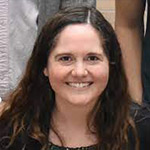
Laura Balzano, Ph.D.
Assistant Professor, Electrical Engineering and Computer Science
Areas of Expertise: Machine learning; modeling with messy data (highly relevant to ML for health); low-dimensional modeling (providing more interpretability for ML for health).
Publications:
Incremental gradient on the Grassmannian for online foreground and background separation in subsampled video
Tensor Methods for Nonlinear Matrix Completion
HePPCAT: Probablistic PCA for Data With Heteroscedastic Noise
“I hope to identify problems that currently use low-rank / PCA / tensor models as a heuristic, or heuristic methods for imputation, outlier detection, or handling heterogeneity, and try to work out statistical models for what a principled approach would look like, in order to build a deeper understanding of what methodologies should be applied in that context.”

Nikola Banovic, Ph.D.
Assistant Professor, Computer Science and Engineering
Areas of Expertise: Human-AI Interaction; explainable and interpretable AI.
Publications:
Behavior Modeling Approach for Forecasting Physical Functioning of People with Multiple Sclerosis
“My research focuses on creating computational technology that enables delivery of personalized healthcare interventions and prevention strategies to people with chronic conditions in a way that increases healthcare access and equity.”

Jasmine Berry, Ph.D.
Computing Innovation Postdoctoral Fellow in AI, Computer Science & Engineering
Areas of Expertise: Precision health and wellness; digital health platforms with IOT services; machine learning and data science analysis for protected health information (PHI).
Publications:
An Analytical Approach to Posture-Dependent Muscle Force and Muscle Activation Patterns
“I would like to join the e-HAIL community to become better acquainted with ongoing projects and ventures at UM. I plan to collaborate with other Ph.D. and M.D. scholars with similar interests in the diagnostic analysis of PHI data. If there is interest among the e-HAIL community members, I can 1) assist in researching multidisciplinary approaches for feasible AI implementation in Health, 2) contribute towards prototyping novel ideas and concepts from research to create functional demos and products, and 3) facilitate aligned collaborations between tech sectors in academia, industry, and business.“

Rupa Bhowmick, Ph.D.
Postdoctoral Fellow, Biomedical Engineering
Areas of Expertise: Computational biologist who aims to design computational software and pipelines that can maneuver treatment regimens for cancer patients and serve patient care at low resource settings. Focus on RE-SEARCHING and RE-UTILIZING the enormous landscape of high-throughput patient data using advanced data-science techniques to reduce the multi-dimensionality of the problems into lower dimensions in order to clarify the underlying mechanism.
Publications:
Exploring the differences in metabolic behavior of astrocyte and glioblastoma: a flux balance analysis approach
“I envision engaging with the e-HAIL community to build a collaborative space where I can interact with the clinicians and fellow data-scientists to identify the global pressing concerns in clinical oncology and solve them as a team.”
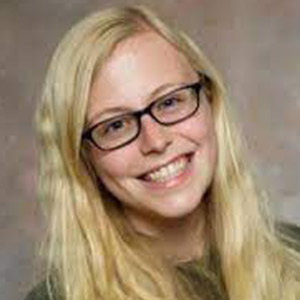
Elizabeth Bondi-Kelly, Ph.D.
Assistant Professor, Computer Science and Engineering
Areas of Expertise: Artificial intelligence (AI) for social impact; multi-agent systems; machine learning (ML) for conservation and public health.
Publications:
Taking Off with AI: Lessons from Aviation for Healthcare
Predicting Micronutrient Deficiency with Publicly Available Satellite Data
Role of Human-AI Interaction in Selective Prediction
“I am committed to interdisciplinary collaboration, and have a great deal of experience with such collaborations. I am excited to build collaborations with others in the e-HAIL community, and happy to contribute to the community through events and discussions. I’m also eager to work with e-HAIL experts to apply for external funding.”
2024 e-HAIL Student Summer Support Program Award (in collaboration with Alex Peahl, M.D., M.Sc, Obstetrics & Gynecology, MM) Supporting Reproductive Health Equity: Understanding Access to Reliable Health Information in the Age of Generative AI

Laurie Buis, Ph.D.
Associate Professor, Department of Family Medicine
Areas of Expertise: Anesthesiology; medical billing; NLP; ML operations
“I am happy to help out in whatever capacity is needed, and I look forward to engaging with the regular meetings.”

Michael Burns, M.D., Ph.D.
Assistant Professor, Anesthesiology
Areas of Expertise: Mobile health
Publications:
Association of Anesthesiologist Staffing Ratio With Surgical Patient Morbidity and Mortality
Machine Learning Comes of Age: Local Impact versus National Generalizability
“I am looking to expand my understanding of machine learning and natural language processing methods and applications.”

Sriram Chandrasekaran, Ph.D.
Assistant Professor, Biomedical Engineering
Areas of Expertise: Precision health and drug discovery using machine learning.
“I’m interested in engaging with e-HAIL to utilize cutting edge data science tools for treating infectious diseases.”

Shirley Cohen-Mekelburg, M.D., M.S.
Assistant Professor, Internal Medicine
Areas of Expertise: Network analysis; prediction; chronic illness care.
Publications:
Association of Anti-Tumor Necrosis Factor Therapy With Mortality Among Veterans With Inflammatory Bowel Disease
“My research focuses on chronic disease management and identifying gaps in healthcare delivery for specialty-managed chronic disease populations. I am working towards developing models that facilitate chronic care transitions, support self-management, and improve care quality. I envision collaborating with colleagues in engineering to develop or adapt existing operational frameworks, using prediction methods to facilitate population health management.”

Amy Cohn, Ph.D.
Professor (CoE) and Chief Transformation Officer (MM), Industrial and Operations Engineering
Areas of Expertise: Optimization; healthcare operations.
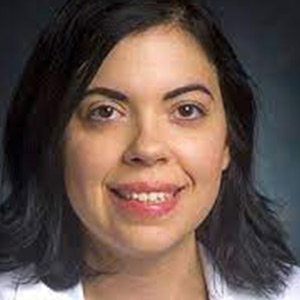
Elizabeth Covington, Ph.D.
Associate Professor, Radiation Oncology
Areas of Expertise: Medical physics; clinical data standardization; health equity; standardized collected of social determinants of health in EHR; oncology.
Publications:
Open RT Structures: A Solution for TG-263 Accessibility
Code Wisely: Risk Assessment and Mitigation for Custom Clinical Software
“I have started attending the Friday meetings to learn about potential collaborations with e-HAIL members and applying for grants together.”

Walter Dempsey, Ph.D.
Assistant Professor, Biostatistics
Areas of Expertise: Experimental design and data analytic methods to inform sequential decision making in mobile health; application of ML to real world mobile and digital health data.
Publications:
Just-in-Time but Not Too Much: Determining Treatment Timing in Mobile Health
iSurvive: An Interpretable, Event-time Prediction Model for mHealth
“I envision collaborating with the e-HAIL community on problems around sequential decision making in e-health areas and leveraging the community’s expertise on AI algorithms as well as running e-health clinical trial to push my research forward.“
2022 e-HAIL Student Summer Support Program Award (in collaboration with Jessica Golbus, M.D., M.S.) The Virtual AppLication-Supported ENvironment To INcrease Exercise During Cardiac Rehabilitation Study (VALENTINE) Study

Paramveer Dhillon, Ph.D.
Assistant Professor, School of Information
Areas of Expertise: New AI methods for high-dimensional datasets or domains with “small n” –many health applications fit that criteria.
Publications:
Social status and novelty drove the spread of online information during the early stages of COVID-19
Interdependence and the cost of uncoordinated responses to COVID-19
Subject-specific functional parcellation via Prior-Based Eigenanatomy
“I am highly interested in health applications and have ongoing collaborations with collaborators from Michigan Medicine. I intend to actively participate in future eHAIL meetings to get to know about others’ research and to potentially forge collaborations.”

Ivo Dinov, Ph.D.
Professor, Nursing, Health Behavior & Biological Sciences, and Systems, Populations
Areas of Expertise: AI/ML; data science; mathematical modeling; statistical computing; brain mapping; neuroscience.
Publications:
Data Science and Predictive Analytics – Biomedical and Health Applications Using R
DataSifterText: Partially Synthetic Text Generation for Sensitive Clinical Notes
Kimesurface representation and tensor linear modeling of longitudinal data
“I’m participating in the e-HAIL community, including to partner on education and training proposals as well we ongoing R&D activities.”

James Eckner, M.D., M.S.
Associate Professor, Physical Medicine and Rehabilitation
Areas of Expertise: Concussion, clinical expertise that can be partnered with analytical expertise.
Publications:
Predicting Risk of Sport-Related Concussion in Collegiate Athletes and Military Cadets: A Machine Learning Approach Using Baseline Data from the CARE Consortium Study
“I am interested in applying powerful analytical tools tools to clinical data to derive novel, clinically-relevant insights.”
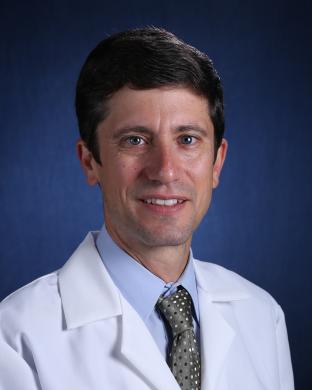
Josh Ehrlich, M.D., M.P.H.
Assistant Professor, Ophthalmology and Visual Sciences
Areas of Expertise: Data science; population data; big data analysis; predictive modeling. My work in sensory health and gerontology consists of secondary analysis and primary data collection and will benefit from AI/ML approaches in future grants and projects.
Publications:
Glaucoma and Cognitive Function Trajectories in a Population-based Study: Findings from the Health and Retirement Study
“Through my work with various population based studies, we collect a large amount of data relevant to geriatric health outcomes, including imaging data in some cases. I foresee developing collaborations via e-HAIL that will enable the use of AI/ML in our future work to enable optimal use of complex data to predict aging outcomes. One such example is with the processing and use of various types of retinal images for such applications.”

Jeffrey Fessler, Ph.D.
Professor, Electrical Engineering and Computer Science
Areas of Expertise: Medical image formation.
Publications:
Image Reconstruction: From Sparsity to Data-Adaptive Methods and Machine Learning
“Most of my group members are working ML methods in the context of medicine (medical imaging).”
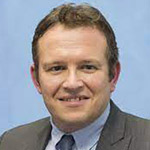
C. Alberto Figueroa, Ph.D.
Professor, Surgery
Areas of Expertise: Medical imaging processing; computational modeling; model order reduction; coronary physiology.
Publications:
A Multi-stage Neural Network Approach for Coronary 3D Reconstruction from Uncalibrated X-ray Angiography Images
AngioNet: A Convolutional Neural Network for Vessel Segmentation in X-ray Angiography
“I’m interested in developing machine learning methods for medical image processing, with the overall goal of extracting anatomical and functional information from medical images such as coronary angiograms.”

Daniel Forger, Ph.D.
Browne Professor, Mathematics
Areas of Expertise: Wearables research, including algorithm development to decode wearable data to score sleep and determine the state of the human circadian clock; new types of AI based on physiology.
Publications:
Consumer-grade wearables identify changes in multiple physiological systems during COVID-19 disease progression
A method for characterizing daily physiology from widely used wearables
“I can provide expertise on the AI/ML side particularly as it applies to physiology, and also on the wearables/app side, especially as it relates to algorithms.”

Lana Garmire, Ph.D.
Associate Professor, Computational Medicine and Bioinformatics
Areas of Expertise: Bioinformatics; computational medicine.
Publications:
ASGARD is A Single-cell Guided Pipeline to Aid Repurposing of Drugs
Emerging artificial intelligence applications in Spatial Transcriptomics analysis
Computational Methods for Single-cell Multi-omics Integration and Alignment
“My research interest lies in applying data science for actionable transformation of human health from the bench to bedside. Current research focus areas include cutting edge single-cell sequencing informatics and genomics; precision medicine through integration of multi-omics data types; novel modeling and computational methods for biomarker research; public health genomics. I would like to collaborate with the broader UM community on precision health and precision medicine to push the needles of clinical diagnosis, management and treatment.”

Irina Gaynanova, Ph.D.
Associate Professor, Public Health-Biostatistics
Areas of Expertise: Wearables research (with particular focus on continuous glucose monitors and ABPMs); multi-omics and microbiome data integration; integration of data of mixed types (zero-inflated, binary, continuous): machine learning.
Publications:
Structural Learning and Integrative Decomposition of Multi-View Data
Modeling Continuous Glucose Monitoring (CGM) Data During Sleep
“I am interested in interdisciplinary science and making an impact by combining my quantitative expertise with clinical and scientific expertise to improve health outcomes and clinical care. I am especially interested in collaborations related to populations with diabetes.”

Anouck Girard, Ph.D.
Professor of Robotics, Engineering
Areas of Expertise: Autonomy; Intelligence, Surveillance and Reconnaissance (ISR) missions; Image classification problems; Human-robot teams.
Publications:
Expert System for Automated Bone Age Determination. Expert Systems with Applications
Automated Classification System for Bone Age Images: a Thresholding Approach to Assess the Impact of Sex-Steroid Exposure on Skeletal Maturation During Puberty. Proceedings of the Androgen Excess and PCOS Society
“For the last decade, as a side project, have been working with Professor Kasa-Vubu in the medical school developing an AI to classify bone age images for pediatric endocrinology. I am interested in participating in e-HAIL meetings and discussions.”

Jessica Golbus, M.D., M.S.
Clinical Instructor, Department of Internal Medicine
Areas of Expertise: Using mHealth technologies to improve the delivery of cardiovascular care; optimizing treatments for patients with advanced systolic heart failure.
“I currently collaborate with multiple e-HAIL members and anticipate sharing our research with the broader community as well as fostering new e-HAIL member collaborations.”
2022 e-HAIL Student Summer Support Program Award (in collaboration with Walter Dempsey, Ph.D.) The Virtual AppLication-Supported ENvironment To INcrease Exercise During Cardiac Rehabilitation Study (VALENTINE) Study
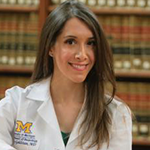
Cathy Goldstein, M.D.
Clinical Associate Professor, Neurology
Areas of Expertise: Sleep; wearables (big data, automation of clinical activities-PSG scoring).
Artificial intelligence in sleep medicine: an American Academy of Sleep Medicine position statement
“I’m interested in engaging with teams to incorporate wearables into research.”

Anhong Guo, Ph.D.
Assistant Professor, Computer Science and Engineering
Areas of Expertise: Human-AI Systems; accessibility; augmented/virtual reality.
Publications:
OmniScribe: Authoring Immersive Audio Descriptions for 360° Videos
StateLens: A Reverse Engineering Solution for Making Existing Dynamic Touchscreens Accessible
Toward Fairness in AI for People with Disabilities: A Research Roadmap
“I’m interested in designing, developing, and deploying hybrid human-AI intelligent interactive systems to provide access to visual information in the real world. By combining the advantages of humans and AI, these systems can enable us to solve problems that are currently impossible with either alone.”
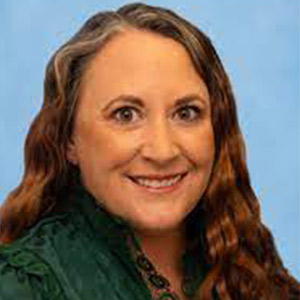
Danielle Haakinson, M.D.
Associate Professor, Surgery
Areas of Expertise: Transplantation and marginal organ utilization, use of informatics to better inform decisions on organ offer acceptance.
“Current collaboration with a project in informing organ offer acceptance with multiple members of the e-HAIL community and seeking to mentor students in this project as a health advisor/expert.”
2024 e-HAIL Student Summer Support Program Award (in collaboration with Mariel Lavieri, Ph.D., Industrial & Operations Engineering) Optimization of Candidate Selection for Deceased Donor Kidney Transplantation

Megan Haymart, M.D.
Professor, Internal Medicine
Areas of Expertise: Cancer health care delivery research with current grant applications incorporating NLP and development of app-like devices.
Publications:
Unmet Information Needs Among Hispanic Women with Thyroid Cancer
Physician management of thyroid cancer patients’ worry
Worry in Thyroid Cancer Survivors with a Favorable Prognosis
“I am a clinician researcher with a focus on cancer care delivery research. My research is shifting towards interventions that incorporate digital health technologies. I look forward to learning from and collaborating with e-HAIL members.”

Xun Huan, Ph.D.
Assistant Professor, Mechanical Engineering
Areas of Expertise: Uncertainty quantification; machine learning for scientific applications.
Publications:
A Bayesian Approach for Quantifying Data Scarcity When Modeling Human Behavior via Inverse Reinforcement Learning
“I would like to participate in e-HAIL events and meetings to help support an interdisciplinary approach for tackling complex problems together, and contribute my experience in computational methods, uncertainty quantification, and physical sciences and engineering.”
2024 e-HAIL Student Summer Support Program Award (in collaboration with Neil Alexander, M.D., M.S., Internal Medicine – Gerontology, MM) Machine Learning Prediction of Balance Impairment for Older Adults Using At-Home Gait Measures

Dhruv Jain, Ph.D.
Assistant Professor, Computer Science & Engineering
Areas of Expertise: Accessibility and AI.
Publications:
HomeSound: An Iterative Field Deployment of an In-Home Sound Awareness System for Deaf or Hard of Hearing Users
Nonverbal Sound Detection for Disordered Speech
“I’m interested in pursuing research and collaboration at the intersection of HCI/Accessibility and AI, and look forward to engaging in discussion with e-HAIL members.”
2023 e-HAIL Student Summer Support Program Award (in collaboration with Michael McKee, M.D., M.P.H., Family Medicine, MM) Mobile Technologies to Improve Healthcare Accessibility for People who are Deaf and Hard of Hearing

Cornelius James, M.D.
Assistant Professor, Department of Internal Medicine
Areas of Expertise: Medical education: teaching learners across the medical education continuum to use AI/ML in clinical practice.
Publications:
Machine Learning: The Next Paradigm Shift in Medical Education
Preparing Clinicians for a Clinical World Influenced by Artificial Intelligence
“I am looking to develop educational strategies that will increase clinician trust and comfort with the use of AI/ML in their practice. Interprofessional collaborations will be essential to educating clinicians, and engagement with e-HAIL will provide an opportunity to establish these important relationships.”

Raymond Jean, M.D., M.H.S.
Clinical Assistant Professor, Surgery
Areas of Expertise: Trauma; emergency general surgery; critical care; health services research; machine learning.
Temporal relationship of computed and structured diagnoses in electronic health record data
“My research focus will involve leveraging clinical data with machine learning to improve perioperative outcomes.”
2024 e-HAIL Student Summer Support Program Award (in collaboration with Maggie Maker, Ph,D., CSE, CoE) Incorporating Machine Learning to Determine Casual Effects in Traume and Emergency General Surgery
2023 e-HAIL Student Summer Support Program Award (in collaboration with Maggie Makar, Ph.D., CSE, CoE) Machine Learning to Determine Causal Effects in Trauma/Emergency General Surgery

David Jurgens, Ph.D.
Associate Professor, School of Information
Areas of Expertise: Natural Language Processing, Generative AI, Computational Social Science
Work Expectations, Depressive Symptoms, and Passive Suicidal Ideation Among Older Adults: Evidence From the Health and Retirement Study
Suicide Among Older Adults Living in or Transitioning to Residential Long-term Care
“I am interested in working with text and conversation data in the healthcare setting to improve patient care. I hope to present at a e-HAIL meeting and identify future collaborations.”

Pedja Klasnja, Ph.D.
Associate Professor, School of Information
Areas of Expertise: Mobile Health, Just-in-Time Adaptive Interventions, Optimization Methods, Implementation Science
Publications:
Microrandomized trials: An experimental design for developing just-in-time adaptive interventions
“I am happy to write grants with e-HAIL members, mentor junior faculty and trainees, and help organize e-HAIL symposia.”

Joseph Kohne, M.D., M.Sc.
Clinical Assistant Professor, Department of Pediatrics
Areas of Expertise: Prediction modeling and care improvement in Acute Lung Injury in Children, using machine learning techniques to support equitable treatment delivery
Publications:
Deep Learning Model Performance for Identifying Pediatric Acute Respiratory Distress Syndrome on Chest Radiographs
Big Kids or Little Adults? Acute Lung Injury Research in Adolescents and Young Adults
“I am interested in participating in a collaborative community of investigators with shared opportunities, challenges, and resources to bridge clinicians and researchers, including outside of U-M and to smaller populations (pediatrics).”

Anna Kratz, Ph.D.
Associate Professor, Physical Medicine and Rehabilitation
Areas of Expertise: Developing and testing of ehealth programs aimed at symptom management (e.g., management of chronic pain and fatigue) in clinical populations.
Publications:
Development and pilot testing of a web-based symptom management program for multiple sclerosis: My MS toolkit
“I am excited to benefit from and contribute to the efforts of e-HAIL in terms of developing new partnerships between engineering and medicine to accelerate ehealth innovations. My main focus within this broad aim is to develop, use, and test ehealth technologies to both monitor the symptoms and functioning of patients and to deliver interventions aimed at optimizing symptom management and cognitive, physical, and social functioning. I have an active training program in my lab and am actively recruiting postdoctoral fellows with engineering/medicine collaborations in mind. There are many challenges to developing robust collaborations to advance ehealth initiatives and I am committed to contributing to the mission of the eHail Community.”
2022 e-HAIL Student Summer Support Program Award (in collaboration with Alanson Sample, Ph.D.) Privacy-Preserving Sensors for the Long-Term Monitoring, Assessment, and Forecasting of Functioning Capabilities of Individuals with Multiple Sclerosis

Andrew Krumm, Ph.D.
Assistant Professor, Department of Learning Health Sciences
Areas of Expertise: Development and use of measurement systems to support health and education organizations; quality improvement.
Publications:
Surgical Trainee Performance and Alignment With Surgical Program Director Expectations
External Validation of a Widely Implemented Proprietary Sepsis Prediction Model in Hospitalized Patients
A Collaborative Approach to Sharing Learner Event Data
“Given my research interests, I hope to support other members’ ongoing projects and engage in collaborative development of future projects.”

Rahul Ladhania, Ph.D.
Assistant Professor, Health Management and Policy
Areas of Expertise: Machine Learning for Causal Inference, with applications in behavior science and healthcare.
Publications:
The Effect of Medicaid Expansion on the Nature of New Enrollees’ Emergency Department Use
Learning and Testing Sub-groups with Heterogeneous Treatment Effects: A Sequence of Two Studies
Megastudies improve the impact of applied behavioural science
A 680,000-person megastudy of nudges to encourage vaccination in pharmacies
“Given the e-HAIL program’s aim of bringing together a community of researchers who work on AI/ML advancements in health, I believe my work and partnerships strongly align with it, and the overall objectives of the program. I’m interested in exploring collaborations with members, actively participate in discussions, and identify areas where I could lead, specifically at the intersection of ML and causality for behavior change.”

Janet Larson, Ph.D., R.N.
Professor, Health Behavior and Biological Sciences
Areas of Expertise: Clinical research with people who have chronic obstructive pulmonary disease (COPD), particularly focused on exercise interventions; development of affordable electronic measure of respiratory rate.
Publications:
Upper-Body Resistance Training and Self-Efficacy Enhancement in COPD
“I would expect to participate in the e-HAIL community building activities including the educational seminars, work-in-progress meetings and the development of competitive research proposals.”
2022 e-HAIL Student Summer Support Program Award (in collaboration with Mohammed Islam, M.S., Sc.D.) Home/Remote Patient Monitoring Using Simple Respiratory Monitoring Device for COPD Patients & AI Processing for Early Identification of Exacerbations

Mariel Lavieri, Ph.D.
Associate Professor, Industrial and Operations Engineering
Areas of Expertise: Medical decision making; stochastic control.
Publications:
Dynamic Forecasting and Control Algorithms of Glaucoma Progression for Clinician Decision Support
Optimal Screening for Hepatocellular Carcinoma: A Restless Bandit Model
Optimal cholesterol treatment plans and genetic testing strategies for cardiovascular diseases
“While I enjoy the creation of new methodology that utilizes health information available to guide sequential decisions over time, I have a key interest in having my research make a difference in the lives of patients and the population. As such, it is crucial for me to work with researchers from different research domains who can ensure that the models my lab creates are not only relevant to the engineering field, but also have the potential of being helpful in practice.”
2024 e-HAIL Student Summer Support Program Award (in collaboration with Danielle Haakinson, M.D., Surgery, MM) Optimization of Candidate Selection for Deceased Donor Kidney Transplantation

Joyce Lee, M.D., M.P.H.
Professor, Pediatrics
Areas of Expertise: Electronic Health Records (EHR); informatics, analytics; endocrinology; health services research; design.
Publications:
Doctor as Designer
“I am interested in big data collaborations focused on health data related to populations with diabetes, obesity, and metabolic disease.“

Jun Li, Ph.D.
Professor, Human Genetics; Computational Medicine and Bioinformatics
Areas of Expertise: Biomedical data science; biostatistics; bioinformatics.
Publications:
Impact of between-tissue differences on pan-cancer predictions of drug sensitivity
Critical limitations of consensus clustering in class discovery
Worldwide human relationships inferred from genome-wide patterns of variation
“I see many opportunities for e-HAIL to interact with the genomics, bioinformatics, and data science communities.“

Zhongming Liu, Ph.D.
Associate Professor, Biomedical Engineering
Areas of Expertise: Medical imaging, primarily magnetic resonance imaging; machine learning algorithms for medical image analysis and precision health; brain-inspired models for artificial intelligence.
Publications:
Representation learning of resting state fMRI with variational autoencoder
Neural Encoding and Decoding with Deep Learning for Dynamic Natural Vision
Explainable Semantic Space by Grounding Language to Vision with Cross-Modal Contrastive Learning
“I am interested in collecting novel medical images with computational imaging methods and contributing advanced analytical tools for computational neuroscience or medical image analysis.”
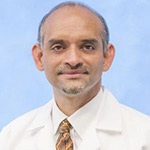
Prashant Mahajan, M.D., M.P.H., M.B.A.
Professor of Emergency Medicine and Pediatrics, Emergency Medicine
Areas of Expertise: Health services research, with focus on data science and ML/AI.
Publications:
Association of RNA Biosignatures With Bacterial Infections in Febrile Infants Aged 60 Days or Younger
“I chair a global emergency research network (www.emergenetwork.org) and I believe collaborating with eHAIL will allow me and the University to expand our impact at a global level.”
2021 e-HAIL Student Summer Support Program Award (in collaboration with Mohammed Islam, M.S., Sc.C.) A novel contact-less physiological measurement system to be integrated with UM Emergency Department’s proprietary disease screening and risk stratification platform

Maggie Makar, Ph.D.
Presidential Postdoctoral Fellow, Computer Science and Engineering
Areas of Expertise: Machine learning (ML) and causal inference, primarily for healthcare applications (guiding decision making in a healthcare setting to broaden patient access to healthcare and improve quality of care for all patient populations).
Publications:
Exploiting structured data for learning contagious diseases under incomplete testing
“I envision engaging with the e-HAIL community in two main ways: through attending the biweekly e-HAIL meetings and by reaching out to specific e-HAIL members to establish collaborations.”
2024 e-HAIL Student Summer Support Program Award (in collaboration with Raymond Jean, M.D., M.H.S., Surgery, MM) Incorporating Machine Learning to Determine Casual Effects in Traume and Emergency General Surgery
2023 e-HAIL Student Summer Support Program Award (in collaboration with Raymond Jean, M.D.. M.H.S., Surgery, MM) Machine Learning to Determine Causal Effects in Trauma/Emergency General Surgery
2022 e-HAIL Student Summer Support Program Award (in collaboration with Daniel Clauw, M.D.) Estimating the causal effect of pain interventions in the presence of uncertain Fibromyalgia

Deanna Marriott, Ph.D.
Research Assistant Professor, Nursing, Systems Populations and Leadership
Areas of Expertise: Biostatistics, particularly in relation to diabetes research; AI for data accessibility.
Publications:
Attrition Bias in an Observational Study of Very Low-Energy Diet: A Cohort Study
Computer Modeling of Diabetes and Its Transparency: A Report on the Eighth Mount Hood Challenge
Chronic Disease Modeling and Simulation Software
“I was introduced to e-HAIL through a collaborator, and contributed to the inaugural symposium via a poster presentation and attendance. I hope to connect more of my colleagues with experts through e-HAIL.”
2021 e-HAIL Student Summer Support Program Award (in collaboration with V.G. Vinod Vydiswaran, Ph.D.) Prototype data-extraction algorithm using Claim Framework and SemNet framework
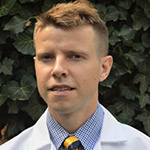
Michael Mathis, M.D.
Assistant Professor, Anesthesiology
Areas of Expertise: Heart failure; machine learning; waveform processing; medical prediction; outcome variation
“I look forward to contributing to e-HAIL as a clinician with data science expertise, and hope I can help methodologic experts attending e-HAIL to target clinically relevant healthcare problems and/or give feedback on quality and reliability of healthcare data used to solve such problems.”

Nik Mazumder, M.D., M.P.H.
Instructor, Internal Medicine Division of Gastroenterology and Hepatology
Areas of Expertise: Risk prediction, computational modeling, and AI; disease focus: cirrhosis; portal hypertension; physiology.
Publications:
The answer at our fingertips: Volume status in cirrhosis determined by machine learning and pulse oximeter waveform
Liver-related mortality is similar among men and women with cirrhosis
“I am interested in improving outcomes for patients with cirrhosis and portal hypertension using advanced data techniques. I have a background in biostatistics and epidemiology (MPH) and a certificate in AI/Machine learning with knowledge of R and Python programming languages. I am excited to learn about ways in which advanced prediction techniques can be leveraged to improve clinical care for patients with liver disease.”

Michael McKee, M.D., M.P.H.
Associate Professor, Family Medicine
Areas of Expertise: Health care accessibility; disability health.
Publications:
Reframing Our Health Care System for Patients with Hearing Loss
Have Almost Fifty Years of Disability Civil Rights Laws Achieved Equitable Care?
“My goals are to learn new strategies to help improve health care accessibility and quality for patients with disabilities. This can also extend to home and work environments.”

Geeta Mehta, Ph.D.
Associate Professor, Materials Science and Biomedical Engineering
Areas of Expertise: Personalized medicine; patient-derived tumoroid models; cancer biology,; mechanobiology, synergistic targeted therapies.
Publications:
Integrated cancer tissue engineering models for precision medicine
“My lab creates 3D in vitro ovarian cancer platforms, to study basic tumor biology, examine effects of mechanical stimulation, and discover novel cross talks between various cell types in the tumor microenvironment. Given the focus on the clinical translation and targeted therapies, we collaborate with multiple labs in the Medical School departments and divisions, in order to realize our goal of improving cancer cure rates. Productive collaborations with medical school and engineering labs that have complementary expertise will be essential in conducting the work that we envision. Therefore, I am committed to e-HAIL and its mission of bringing together diverse partners to solve challenging biomedical problems that create large and complex datasets.”

Rada Mihalcea, Ph.D.
Professor, Computer Science and Engineering
Areas of Expertise: Natural language processing; computational social science; multimodal processing.
Publications:
Understanding the Impact of COVID-19 on Online Mental Health Forums
Expressive Interviewing: A Conversational System for Coping with COVID-19
Towards Automatic Detection of Misinformation in Online Medical Videos
2021 e-HAIL Student Summer Support Program Award (in collaboration with Veronica Perez-Rosas and Lawrence An, M.D.) Exploratory analysis of misinformative health news about COVID-19 from social media platforms
2023 Data Annotation Award (in collaboration with Larry An, M.D., and Kenneth Resnicow, Ph.D.) Scaling-up Data-driven NLP Tools for Behavioral Counselor Training

Swati Mody, M.D.
Associate Professor, Radiology
Areas of Expertise: Pediatric radiology, including pediatric neuroradiology, pediatric cardiac imaging, and fetal imaging
Publications:
Unsupervised abnormality detection in neonatal MRI brain scans using deep learning
“I would like to explore the use of machine learning methods in various sections of Radiology. I am looking into using such methods in assessing bone age, evaluation of scoliosis in radiography, evaluation of neonatal brain MRI, and brain ultrasound.”

Emily Mower Provost, Ph.D.
Associate Professor, Computer Science and Engineering
Areas of Expertise: Machine learning
Publications:
Articulatory Coordination for Speech Motor Tracking in Huntington Disease
“I would like to continue to attend e-HAIL meetings and I am interested in identifying new collaborative opportunities.”
2024 e-HAIL Student Summer Support Program Award (in collaboration with Sarah Sperry, Ph.D., Psychiatry, MM) Understanding Contextual Influences on Human Emotion Perception and Expression Using Digital Tools
2023 e-HAIL Student Summer Support Program Award (in collaboration with Sarah Sperry, Ph.D., Psychiatry, MM) Measuring Emotion Variability in Mental Health
2021 e-HAIL Student Summer Support Program Award (in collaboration with Melvin McInnis, M.D.) Methods to extract information about bipolar disorder discussions from unstructured forum posts (subreddits)

Susan Murphy, Sc.D.
Professor, Physical Medicine and Rehabilitation
Areas of Expertise: I develop digital health interventions and telerehabilitation interventions for chronic condition management. I am in the process of exploring AI in an effort to increase intervention sustainability and scalability.
Experiences of Exergaming for Upper Extremity Exercises in People with Systemic Sclerosis
“I am interested in meeting AI experts, engineers, and biostatisticians to develop AI supported interventions to evolve my current intervention development.”

Kayvan Najarian , Ph.D. Professor, Computational Medicine and Bioinformatics Areas of Expertise: Leveraging artificial intelligence (AI) and machine learning (ML) for medical applications through clinical decision support systems and drug discovery and assessment. Resulting AI-based technologies for clinical decision support systems feature advanced signal/image processing

Brahmajee Nallamothu, M.D. Professor, Internal Medicine Areas of Expertise: Data Science; mHealth; digital health; sensors. Publications: AngioNet: a convolutional neural network for vessel segmentation in X-ray angiography Provider Care Team Segregation and Operative Mortality Following Coronary Artery Bypass Grafting "I am very interested in multidisciplinary collaboration and excited about grant opportunities outside traditional mechanisms." 2022 e-HAIL Student Summer Support Program Award (in collaboration with C. Alberto Figueroa, Ph.D.) Machine Learning Methods for Assessment of Coronary Artery Disease using Angiographic Data

Satish Narayanasamy, Ph.D. Professor, Computer Science and Engineering Areas of Expertise: Privacy for ML and data analytics; secure hardware; GPU and accelerators; systems for genome sequencing. Publications: SquiggleFilter: An Accelerator for Portable Virus Detection InvisiPage: oblivious demand paging for secure enclaves Ultra-rapid somatic variant detection via real-time targeted amplicon sequencing "Privacy and safety are significant concerns in generative AI. Recent advancements in hardware and software systems (secure enclaves, federated learning) can help aggregate sensitive data from multiple institutions and train ML models on without compromising their privacy. They can also allow clinicians to use LLM models without compromising privacy of their queries, while also allowing model developers to protect their IP from its users."

Jeong Joon Park, Ph.D.
Assistant Professor, Computer Science and Engineering
Areas of Expertise: Computer Vision; generative Models; computer graphics. Many of these topics are related to medical imaging research.
Publications:
Google Scholars
“I am eager to participate in e-HAIL events to seek collaborators for projects that require 3D computer vision or generative models.”

Alex Peahl, M.D., M.Sc.
Assistant Professor, Obstetrics and Gynecology
Areas of Expertise: Health services research; improving the efficacy, efficiency, and equity of maternity care through novel methods and interprofessional partnerships with engineering, design, public health and community partners.
Publications:
Designing Prenatal Care for Low-income, Black Patients in Urban Settings Using Human Centered Design
The Effect of Tailored Prenatal Care Policies with Telemedicine on Outpatient Clinic Operations
The Evolution of Prenatal Care Delivery Guidelines in the United States
“I envision bringing expertise in clinical content and interprofessional collaboration to working with the e-Hail community to push the current boundaries of reproductive health research through advanced AI methodologies.”
2024 e-HAIL Student Summer Support Program Award (in collaboration with Elizabeth Bondi-Kelly, Ph.D., CSE) Supporting Reproductive Health Equity: Understanding Access to Reliable Health Information in the Age of Generative AI

Veronica Perez-Rosas, Ph.D.
Assistant Research Scientist, Computer Science and Engineering
Areas of Expertise: Natural Language Processing (NLP) for healthcare applications, including conversational analysis, health misinformation detection, multimodal approaches for health behavior prediction.
Publications:
What Makes a Good Counselor? Learning to Distinguish Between High-quality and Low-quality Counseling Conversations
Towards Automation Detection of Misinformation in Online Medical Videos
Template-based ReflectiVE Rewriting for MotiVational IntErviewing
“My research focuses on developing computational methods to analyze, recognize, and predict human behaviors during social interactions. I am interested in collaborating with the e-HAIL community in studying conversational aspects of clinical interactions, prediction and analyses of provider behaviors, as well as designing NLP-based approaches to address misinformation in healthcare.”

John Piette, Ph.D.
Professor of Public Health, Health Behavior and Health Education
Areas of Expertise: Digital support for chronic disease; reinforcement learning; digital solutions in global health; digital mental health and pain management; effective communication (motivational interviewing and CBT).
“I’m looking forward to building collaborations with experts in AI/RL who can help us move the needle in clinical trials and methodologic studies designed to help RL optimize treatment decisions rapidly and with sparse data.“
2023 Data Annotation Award (in collaboration with Veronica Perez-Rosas) Natural Language Processing for Enhanced Behavioral Counseling in Spanish

Jodyn Platt, M.D., M.P.H.
Associate Professor, Learning Health Sciences
Areas of Expertise: Public, patient, and other stakeholder perspectives on policy for data and information in healthcare and the use of AI/ML in Clinical Decision Support.
Publications:
Applying Anti-Racist Approaches to Informatics: A New Lens on Traditional Frames
“A main goal of my work is to identify factors that influence trust in complex information systems and to develop evidence-based and actionable recommendations that can inform issues of institutional, state, and federal health policy. I look forward to engaging e-HAIL members in this work. I also look forward to collaboration with e-HAIL on our new Trust, Innovation, and Ethical Research for Responsible AI (TIERRA) program.”

Vitaliy Popov, Ph.D.
Assistant Professor, Department of Learning Health Sciences
Areas of Expertise: Learning sciences, learning analytics, science of team science, computer supported collaborative learning (CSCL), computer supported cooperative work (CSCW), Human-Computer Interaction, team-based clinical simulation training, eXtended Reality.
“I am primarily interested in collaborative efforts within the e-HAIL community to solve research problems in the field of medical education, focusing on the ways in which healthcare professionals collaborate, coordinate, and influence one another to learn and/or perform together, usually in technology rich learning or clinical environments.”I would like to continue to attend e-HAIL meetings and I am interested in identifying new collaborative opportunities.”
2023 e-HAIL Student Summer Support Program Award (in collaboration with Alanson Sample, Ph.D., EECS, CoE) Multimodal Debriefing System for VR Simulation-based Emergency Training
2021 (extended for 2022) e-HAIL Student Summer Support Program Award (in collaboration with Xu Wang, Ph.D.) Data-Driven Assessment Methods for Intraoperative Entrustment of Surgical Residents
2023 Data Annotation Award (in collaboration with Alanson Sample, Ph.D.) AI-enhanced Closed-loop Communication Annotation Tool for Medical Education

Majdi Radaideh, Ph.D.
Assistant Professor, Nuclear Engineering and Radiological Sciences
Areas of Expertise: At U-M, I lead the AIMS lab (Artificial Intelligence and Multiphysics Simulations) in the Department of Nuclear Engineering and Radiological Sciences, which focuses on the intersection between nuclear reactor design, multiphysics modeling and simulation, advanced computational methods, and machine learning (ML) algorithms. My multidisciplinary experience in applied machine learning encompasses both numerical and image data, experience with the three AI/ML paradigms (supervised, unsupervised, reinforcement), experience in high-performance computing tools for AI/ML training and deployment, and experience in software engineering to develop open-source tools as part of large AI/ML projects.
Publications:
Physics-informed reinforcement learning optimization of nuclear assembly design
Neural-based time series forecasting of loss of coolant accidents in nuclear power plants
“I envision e-HAIL as a great opportunity to expand my collaborator network, build multidisciplinary grant proposals, explore how my research can be impactful beyond my traditional field, and to see how AI is progressing in other major and data-centric fields like healthcare.”

Sundaresh Ram, Ph.D.
Research Assistant Scientist, Department of Radiology
Areas of Expertise: Signal/Image/Video Processing; Computational Imaging; Medical Imaging; Pattern Recognition & Machine Learning
Improved detection of air trapping on expiratory computed tomography using deep learning
Image Denoising Using Superpixel-Based PCA
“I look forward to collaborating with the e-HAIL community on the various healthcare problems and contribute to developing clinically translatable analytical imaging tools that will help answer these questions.”
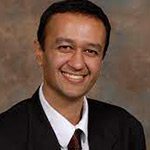
Karthik Ramani, M.D., M.H.A., M.B.
Clinical Assistant Professor, Internal Medicine – Nephrology
Areas of Expertise: Health Technology; healthcare entrepreneurship; health care strategy relevant to kidney disease and beyond.
Publications:
Considerations in Access Cannulation: Traditional and Evolving Approaches
Global Challenges with Providing Vascular Access Care During COVID Era
Inpatient Diagnosis and Treatment of Catheter-Related Bloodstream Infection
“I am enthusiastic about engaging with e-HAIL initiative, as it aligns perfectly with my commitment to leveraging technology for equitable advancements in healthcare as exemplifed by my work on the app CORE (COnnecting REsearch). By democratizing access to clinical trials, CORE aims to bridge gaps and address disparities in healthcare research. My experience with CORE has not only equipped me with technical skills but has also deepened my understanding of the importance of interdisciplinary collaboration, a key focus of the e-HAIL initiative. I am keen on exploring potential synergies between my current and future work and the objectives of e-HAIL.”

Arvind Rao, Ph.D.
Associate Professor, Computational Medicine and Bioinformatics
Areas of Expertise: Machine learning for image informatics for biomedical applications; data integration of multi-omics data; bioinformatics and biomedical data science.
“I’m interested in engaging e-HAIL colleagues around methods and applications for biomedical data science. We analyze omics, radiology, pathology imaging data and develop predictive models that integrate them in a variety of settings. Another interest is in the application of these tools to global health problems (eg: trial recruitment algorithms using AI on images, automated diagnoses engines).“

Andrew Read, M.D., M.S.
Assistant Professor, Internal Medicine Division of Gastroenterology
Areas of Expertise: Development of prediction models using electronic health data; implementation of prediction models into clinical use to improve diagnosis of GI tract cancers.
Prediction of Gastrointestinal Tract Cancers Using Longitudinal Electronic Health Record Data
“I am interested in continuing to participate and engage with other members of the e-HAIL community, to improve my understanding of methods used in prediction model development and translation into clinical practice, and develop collaborations for future funding submissions.”
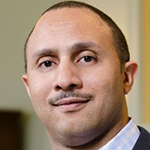
Lionel Robert, Ph.D.
Professor, School of Information
Areas of Expertise: Human-robot interaction; human-AI interaction.
Publications:
A Systemic Review of Human and Robot Personality in Health Care Human-Robot Interaction
Bridging the Health Disparity of African Americans Through Conversational Agents
“As robots become increasingly central to healthcare it seems timely and important to understand how to effectively employ these robots. I am interested in collaborating with healthcare researchers who are deploying robots in their workplaces and want to better understand how to deploy more effectively.”

Alexander Rodríguez, Ph.D.
Assistant Professor, Electrical Engineering and Computer Science
Areas of Expertise: AI for public health; computational epidemiology; spatiotemporal machine learning; scientific machine learning; uncertainty quantification
Publications:
DeepCOVID: An Operational Deep Learning-driven Framework for Explainable Real-time COVID-19 Forecasting
Data-Centric Epidemic Forecasting: A Survey
Differentiable Agent-based Epidemiology
“I am excited to collaborate with e-HAIL to innovate in public and clinical health, developing dependable AI solutions that integrate both population and patient-specific data.”

Michael Rubyan, Ph.D., M.P.H.
Clinical Assistant Professor, Public Health, Health Management and Policy
Areas of Expertise: Healthcare provider behavior change; implementation science; online responsive platforms adapting LLMs; community engagement; mobile apps.
Publications:
A Conceptual Framework for Clinical and Translational Virtual Community Engagement Research
Surgeon Behaviors Related to Engaging Patients in Smoking Cessation at the Time of Elective Surgery
“I envision engaging in interdisciplinary research that adapts and incorporates AI, ML, and LLMs to change provider behavior. I am interested in collaborating with other members to identify areas where we can innovate, and advance novel approaches for reforming the healthcare delivery system using AI, ML, and LLMs.”

Alanson Sample, Ph.D.
Associate Professor, Computer Science & Engineering
Areas of Expertise: Computer science; embedded systems; machine learning.
Publications:
Interactive Sensing & Computing Lab
“I’m collaborating with colleagues in the Med School and looking forward to attending the e-HAIL meetings.“
2023 e-HAIL Student Summer Support Program Award (in collaboration with Vitally Popov, Ph.D., DLHS, MM) Multimodal Debriefing System for VR Simulation-based Emergency Training
2022 e-HAIL Student Summer Support Program Award (in collaboration with Anna Kratz, Ph.D.) Privacy-Preserving Sensors for the Long-Term Monitoring, Assessment, and Forecasting of Functioning Capabilities of Individuals with Multiple Sclerosis
2023 Data Annotation Award (in collaboration with Vitally Popov, Ph.D.) AI-enhanced Closed-loop Communication Annotation Tool for Medical Education

Liyue Shen, Ph.D.
Assistant Professor, Electrical Engineering & Computer Science
Areas of Expertise: Biomedical AI, encompassing machine learning; computer vision; signal and image processing; medical image analysis; biomedical imaging, and data science.
Attention-Guided Deep Learning for Gestational Age Prediction using Fetal Brain MRI
“The goal for my research is to develop efficient and reliable AI/ML-driven computational methods for biomedical imaging and informatics to tackle real-world biomedicine and healthcare problems, including but not limited to, personalized cancer treatment and precision medicine. I am excited to collaborate and contribute to the e-HAIL community.“

Karandeep Singh, M.D., MMSc
Assistant Professor, Department of Learning Health Sciences
Areas of Expertise: Development, evaluation, and implementation of machine learning models within electronic health record (EHR) systems in support of a learning health system.
Publications:
External Validation of a Widely Implemented Proprietary Sepsis Prediction Model in Hospitalized Patients
“I look forward to being part of the e-HAIL community both to learn and to contribute. I envision being engaged in many aspects of e-HAIL.”

Geoffrey Siwo, Ph.D.
Research Assistant Professor, Internal Medicine
Areas of Expertise: Development and application of AI/ML methods to clinical medicine and global health datasets with an emphasis on low-resource settings.
Publications:
Leveraging crowdsourcing to accelerate global health solutions
Generative AI Design and Exploration of Nucleoside Analogs
Hackathons as a means of accelerating scientific discoveries and knowledge transfer
“I hope to establish new collaborative projects with other members of the U-M research community to in the long-term, collectively address critical barriers in e-Health, and in the short-term, develop grant proposals to support such activities.”
2023 e-HAIL Student Summer Support Program Award (in collaboration with Ji Zhu, Ph.D., Statistics, LSA) Leveraging Generative AI to Simulate Patient Trajectories from Routine Clinical Lab Tests

Michael Sjoding, M.D.
Associate Professor, Internal Medicine, Division of Pulmonary and Critical Care
Areas of Expertise: Application of machine learning to critical care; Bias in algorithms and healthcare technologies; use of chest radiographs in machine learning.
Publications:
All models in health care are not colour blind and we should not be either
“I am interested in bringing new data types and computational approaches to address clinical problems in pulmonary and critical care medicine. I am also committed to fostering collaborations between experts in medicine and artificial intelligence/machine learning.“
Data Annotation Award (in collaboration with David Fouhey, Ph.D.) Understanding the Role of AI Explanations in AI-clinician Collaborations

Sarah Sperry, Ph.D.
Assistant Professor, Psychiatry
Areas of Expertise: Emotion detection via digital tools (smartphones, wearable devices); personalized medicine in bipolar disorder; use of intensive longitudinal data, electronic health record data, and digital data to predict illness trajectory.
Publications:
Bipolar spectrum psychopathology is associated with altered emotion dynamics across multiple timescales
Prospective Validation of an Electronic Health Record-Based, Real-Time Suicide Risk Model
“e-HAIL will provide me with the opportunity to work with collaborators outside of my field to improve diagnosis, monitoring, and treatment of mental health conditions using AI and data science approaches.”
2024 e-HAIL Student Summer Support Program Award (in collaboration with Emily Mower Provost, Ph.D., CSE, CoE) Understanding Contextual Influences on Human Emotion Perception and Expression Using Digital Tools
2023 e-HAIL Student Summer Support Program Award (in collaboration with Emily Mower Provost, Ph.D., CSE, CoE) Measuring Emotion Variability in Mental Health

Ryan Stidham, M.D., M.S.
Associate Professor, Internal Medicine, Division of Gastroenterology
Areas of Expertise: Digital health in medicine, including developing new data sources and leveraging unstructured data from clinical imaging; clinical imaging acquisition, manipulation, and analysis (CT, MRI, and ultrasound imaging); medical video research (video signals processing, data standardization and compression, I/O, UI/UX). Commercial applications of digital health and collaborations with medical industry partners.
Motion-based camera localization system in colonoscopy videos
“I am 100% committed to high impact innovation and developing new, not iterative, technologies and methods in health care. I envision serving as another bridge between medicine and engineering (hardware/software) to solve shared problems, as I most enjoy projects where there are opportunities for innovation in both engineering and medicine. Specifically, I can envision aiding in clinical data collection, assessment, and clinical trial design for EE/CS or Mech-E engineering partners to address their needs with consideration of testing needed for clinical use and regulatory filings.”

J. Scott VanEpps, M.D., Ph.D.
Associate Professor, Emergency Medicine
Areas of Expertise: My laboratory is motivated to develop novel approaches to the diagnosis and treatment of life-threatening infection. Our work is characterized by three specific areas of investigation: (1) Antimicrobial nanoparticles; (2) In situ treatment strategies for medical device infections; and (3) Rapid diagnostics for bacteria infections and sepsis.
Publications:
Sepsis Trajectory Prediction Using Privileged Information and Continuous Physiological Signals
Unifying Structural Descriptors for Biological and Bioinspired Nanoscale Complexes
“The transdisciplinary nature of my research program and expertise lends itself to multiple collaborations, including as co-I on an NIH R01 to predict outcomes in pediatric sepsis based on a combination of host and pathogen features using machine learning. I look forward to continueing and expanding this very successful approach by working with the e-HAIL initiative.”
2024 e-HAIL Student Summer Support Program Award (in collaboration with Angela Violi, Ph.D., Mechanical Engineering) Health at the Atomic Level: Nanoscale Interactions Using ML

Mark Van Oyen, Ph.D.
Professor, Industrial & Operations Engineering
Areas of Expertise: Sequential/longitudinal medical decision making through machine learning;; adaptive learning with optimization, and systems modeling and control (diseases include chronic kidney disease, third line drug blood pressure control for diabetics, open angle glaucoma, normal tension glaucoma, ocular hypertension, and age-related macular degeneration). Healthcare operations engineering and management (health system operations include: Emergency Department redesign; “in-advance” appointment scheduling,; system-wide patient flow prediction and admissions control; clinical research unit operations; coordinated care for integrated care systems; and more.)
Publications:
Dynamic Monitoring and Control of Irreversible Chronic Diseases with Application to Glaucoma
Online Resource Allocation with Personalized Learning
Complexity-Augmented Triage: A Tool for Improving Patient Safety and Operational Efficiency

Angela Violi, Ph.D.
Professor, Mechanical Engineering
Areas of Expertise: Molecular simulations and applied machine learning; nanoparticles; biological systems and biophysics.
Publications:
On Drug-Membrane Permeability of Antivirals for SARS-CoV-2
A deep learning architecture for metabolic pathway prediction
“I am interested in learning more about the community, the problems they face, connect with clinicians, and build a deeper understanding of the methodologies used in the field.”
2024 e-HAIL Student Summer Support Program Award (in collaboration with Scott J. VanEpps, M.D., Ph.D., Emergency Medicine, MM) Health at the Atomic Level: Nanoscale Interactions Using ML
2023 e-HAIL Student Summer Support Program Award (in collaboration with Thomas Schmidt, Ph.D., Microbiology and Epidemiology, MM) On the Relationship Between Supplement Consumption and Gut Microbiome

V.G. Vinod Vydiswaran, Ph.D.
Associate Professor, Department of Learning Health Sciences
Areas of Expertise: Natural Language Processing; health text analysis; Artificial Intelligence; information trustworthiness.
Publications:
Multicenter Validation of Natural Language Processing Algorithms for the Detection of Common Data Elements in Operative Notes for Total Hip Arthroplasty: Algorithm Development and Validation
Human versus machine editing of electronic prescription directions
“I envision actively engaging with researchers, postdocs, and students on brainstorming AI and informatics-based solutions to health care challenges, participating regularly in eHAIL meetings, and contributing to research and training mission of e-HAIL.”
2021 e-HAIL Student Summer Support Program Award (in collaboration with Deanna Marriott, Ph.D.) Prototype data-extraction algorithm using Claim Framework and SemNet framework

Akbar Waljee, M.D., M.Sc.
Professor, Internal Medicine – Gastroenterology
Areas of Expertise: AI and Health; using longitudinal data in low resource settings.
Publications:
Adapted time-varying covariates Cox model for predicting future cirrhosis development performs well in a large hepatitis C cohort
Performance of a Deep Learning Model vs Human Reviewers in Grading Endoscopic Disease Severity of Patients With Ulcerative Colitis
“Meeting new people, developing new methods that are applicable to risk models using AI in low resource settings.”
2022 e-HAIL Student Summer Support Program Award (in collaboration with Ji Zhu, Ph.D.) AI/ML methodologies to predict chronic hepatitis B (CHB) disease progression in Africa

Xu Wang, Ph.D.
Assistant Professor, Computer Science and Engineering
Areas of Expertise: Human-centered computing, clinician training in medical contexts.
Publications:
Towards Supporting Intraoperative Coordination and Entrustment in Surgical Faculty-Resident Dyads: Looking Together Together Does Not Equal Seeing the Same Thing
Towards Process-Oriented, Modular, and Versatile Question Generation that Meets Educational Needs
Practice-Based Teacher Questioning Strategy Training with ELK: A Role-Playing Simulation for Eliciting Learner Knowledge
“I am interested in 1) learning what is going on in the research community on topics related to AI + health; and 2) forming collaborations with medical collaborators.”
2021 (extended for 2022) e-HAIL Student Summer Support Program Award (in collaboration with Vitally Popov, Ph.D.) Data-Driven Assessment Methods for Intraoperative Entrustment of Surgical Residents

Josh Welch, Ph.D.
Assistant Professor, Computational Medicine and Bioinformatics
Areas of Expertise: Machine learning; deep generative models; tensors; genomic data analysis.
Publications:
Iterative single-cell multi-omic integration using online learning
Variational Mixtures of ODEs for Inferring Cellular Gene Expression Dynamics
Multi-omic single-cell velocity models epigenome-transcriptome interactions and improves cell fate prediction
“My research aims to develop machine learning approaches for modeling and learning from single-cell genomic data.“

Jenna Wiens, Ph.D.
Associate Professor of Computer Science and Engineering, Associate Director of the AI lab, Computer Science and Engineering
Areas of Expertise: Machine learning for healthcare.
Publications:
Early identification of patients admitted to hospital for covid-19 at risk of clinical deterioration: model development and multisite external validation study
Model Selection for Offline Reinforcement Learning: Practical Considerations for Healthcare Settings
Clinician-in-the-Loop Decision Making: Reinforcement Learning with Near-Optimal Set-Valued Policies
“Our current research portfolio focuses on major public health problems – including infectious disease, Alzheimer’s disease, and diabetes, among others. We develop and apply state-of-the-art AI/ML methods to analyze large longitudinal health datasets. Our work spans several aspects of AI including time-series analysis, reinforcement learning, computer vision, and causal inference. We aim to develop the computational methods needed to help organize, process, and transform data into actionable knowledge with the ultimate goal of improving health.”
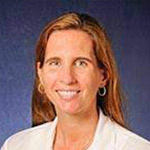
Maria Woodward, M.D., M.Sc.
Associate Professor, Ophthalmology and Visual Science
Areas of Expertise: Diagnosis and monitoring of corneal diseases.
Measurement Reliability for Keratitis Morphology
Natural Language Processing to Quantify Microbial Keratitis Measurements
“I actively use ML/AI tools in my research and want to be part of the community.”

Zhenke Wu, Ph.D.
Assistant Professor, Public Health, Biostatistics
Areas of Expertise: Bayesian methods; large-scale computing; causal inference; sequential decision making; reinforcement learning; EHR/claims data.
Publications:
Effectiveness of gamified competition in the context of mHealth intervention for medical interns: a microrandomized trial
Probabilistic cause-of-disease assignment using case-control diagnostic tests: a hierarchical Bayesian approach
Tree-Informed Bayesian Multi-Source Domain Adaptation: Cross-population Probabilistic Cause-of-death Assignment using Verbal Autopsy
“I am interested in seeing and understanding where statistical/machine learning tools can help with unmet clinical needs. For this, I like the mix of clinicians, scientists, and engineers in this group. I also hope to understand the obstacles in translating methodological innovations into clinical contexts.”

Stella Yu, Ph.D.
Professor, Computer Science and Engineering
Areas of Expertise: Computer vision; machine learning.
Publications:
Predicting Demographics from Meibography Using Deep Learning
Meibography Phenotyping and Classification from Unsupervised Discriminative Feature Learning
“I am interested in enabling medical researchers to discover patterns from data with minimal human supervision.”

Justine Zhang, Ph.D.
Assistant Professor, School of Information
Areas of Expertise: Natural language processing; computational social science. I’m eager to draw on these areas to provide insights on interactions that take place in healthcare contexts.
Publications:
Finding Your Voice: The Linguistic Development of Mental Health Counselors
Balancing Objectives in Counseling Conversations: Advancing Forwards or Looking Backwards
Quantifying the Causal Effects of Conversational Tendencies
“My research focuses on analyzing conversations with computational methods, and on examining the role these conversations play in broader social systems. Healthcare settings contain many examples of interactions, and I’d like to find collaborators who can help me navigate these settings and access data, and whose research interests I can support and complement.“

Chuan Zhou, Ph.D.
Research Professor, Radiology
Areas of Expertise: Diagnostic decision support; machine learning including deep learning, quantitative image analysis, prediction of disease progression, risk stratification, treatment response assessment and treatment decision making and monitoring.
Publications:
Hybrid U-Net-based deep learning model for volume segmentation of lung nodules in CT images
“I am very interested in multidisciplinary collaboration that integrates artificial intelligence (AI), machine learning, quantitative analysis of bioinformatics, and computer vision in the development of computerized decision support systems and predictive models to design and optimize the pathway for disease diagnosis, therapeutic intervention and prognosis, using multidimensional data.”

Ji Zhu, Ph.D.
Susan A. Murphy Professor of Statistics, Literature, Science and the Arts
Areas of Expertise: Statistical Machine Learning.
Publications:
SODEN: A Scalable Continuous-Time Survival Model Through Ordinary Differential Equation Networks
Prediction Models for Network-Linked Data
“I have been working with clinicians for the past 10+ years on applying statistical ML methods to address clinically meaningful problems. These have been fruitful and rewarding experiences, and I look forward to continuing the collaborations as well as exploring new opportunities.”
2023 e-HAIL Student Summer Support Program Award (in collaboration with Geoffrey Siwo, Ph.D., Internal Medicine, MM) Leveraging Generative AI to Simulate Patient Trajectories from Routine Clinical Lab Tests
2022 e-HAIL Student Summer Support Program Award (in collaboration with Akbar Waljee, M.D., M.Sc.) AI/ML methodologies to predict chronic hepatitis B (CHB) disease progression in Africa

 MENU
MENU 
